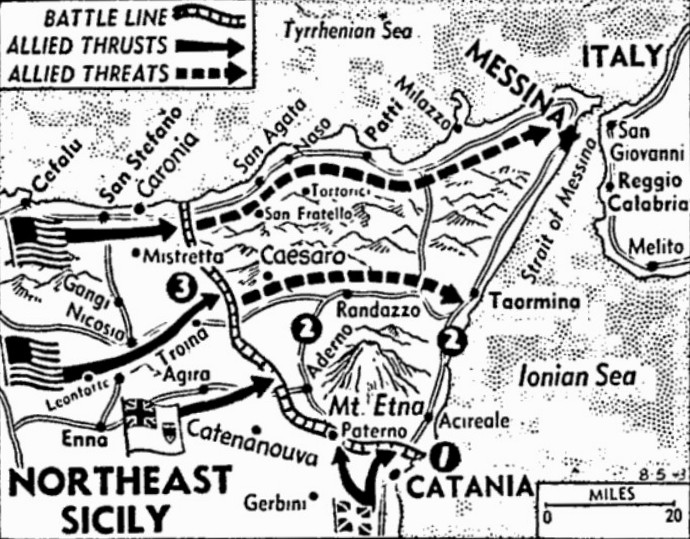‘Damned Americans’ shoot all time, Nazis complain
Harassed Germans do virtually all the defensive fighting in Sicily; Italians turn on them
By Richard Mowrer
With the 7th Army in Sicily, Italy –
These damned Americans fight all day and all night, and shoot all the time.
This phrase, taken from a German letter that was never mailed, adequately sums up the German soldier’s estimate of what he is up against in Sicily; numerous and aggressive Americans and lots of artillery fire, not to mention that of automatic weapons.
The Germans are fighting practically alone. Italian opposition is virtually nonexistent on the U.S. 7th Army’s front in northern Sicily.
Our troops meet some Italians, but they are few in number. Most of them are Blackshirt troops, who, since the fall of Mussolini, have been ordered to discard their Fascist Blackshirts for the uniform of the regular Italian Army.
Nazis in bad hole
Some Italian artillery forces are still supporting the Germans. But in the actual fighting line, it’s the Germans who are doing the fighting, with determination, skill and mounting desperation.
The Germans here are in a bad situation. They have the powerful U.S. 7th and British 8th Armies opposite them and the Allied air forces over their heads, and they are fighting at the deep extremity of the country of their Italian allies, who are close to collapse and whose troops do not want to fight anymore.
The Italians are even beginning to turn on the Germans. The Germans have complained of Italians firing on them, and stories of anti-German sabotage by Italian soldiers are becoming common. The Italians never liked their Nazi allies much, and now they resent them because they feel that the Germans are prolonging the war. As long as the Germans fight, at least on Italian soil, they are an obstacle to the peace which most Italians want more than anything else.
Advantage in defense
The Germans have had one advantage of fighting defensive actions in very rugged terrain. Being on the defensive, they could fortify heights and survey terrain for their artillery which we have had to attack. But they are up against superior odds.
They have had several divisions in Sicily, but these were not all full strength. The ghost of the old 15th Panzers, which surrendered to the British 8th Army in Tunisia, has appeared on this front. It now consists partly of Slovenes, Poles and Frenchmen from annexed territories.
What the Germans call the 15th Panzers is really “the phony 15th,” as far as we are concerned. In the estimate of U.S. officers who fought in Tunisia, the Germans in Sicily are not as tough as those they were up against in Africa.
Few airfields left
The Germans are up against a superior air force. Their own has been forced off Sicily to the extent that they have only a few landing strips on it, and no permanent airfields. Since Sunday, their planes have been more active, but never on a large scale.
By day, the Nazis limit themselves to the use of fighters equipped to carry bombs. Their bombers operate mostly at night.
Our artillery has been and continues to be very effective. The Germans do not like it at all. They have lost heavily to our artillery, which has blasted them repeatedly out of good positions.
Matter of hours
The Germans tried hard to maintain a continuous front from the north to the eastern shores of Sicily. So far, they have had the advantage of being in possession of high points along Mt. Etna’s slopes, which give them command of the surrounding country. But it I snow only a matter of hours, high-ranking American officers believe, until the Germans will be forced back so far that their continuous line will be divided in two by Etna.
Meanwhile:
The damned Americans are fighting all day and all night, and shooting all the time.


